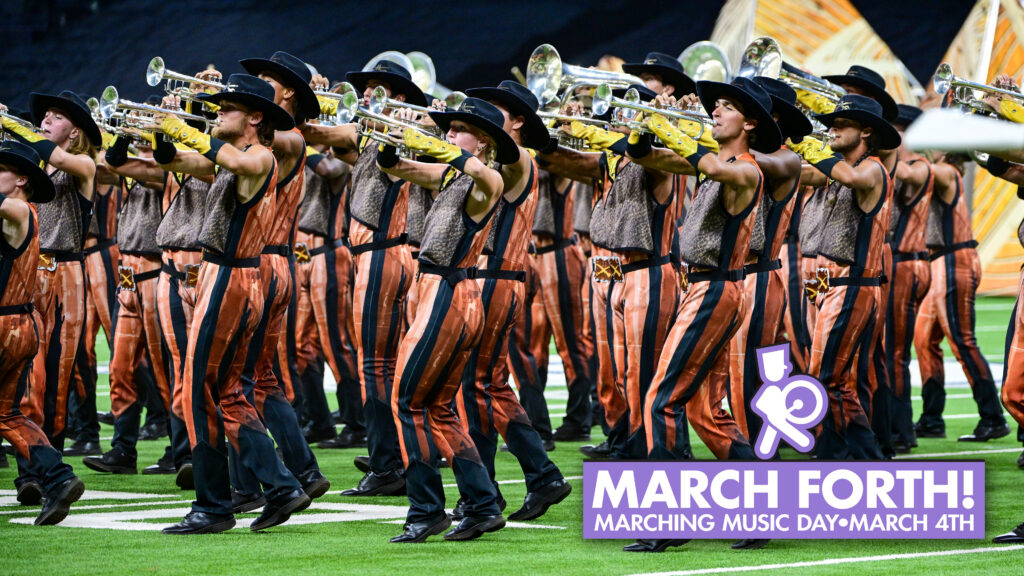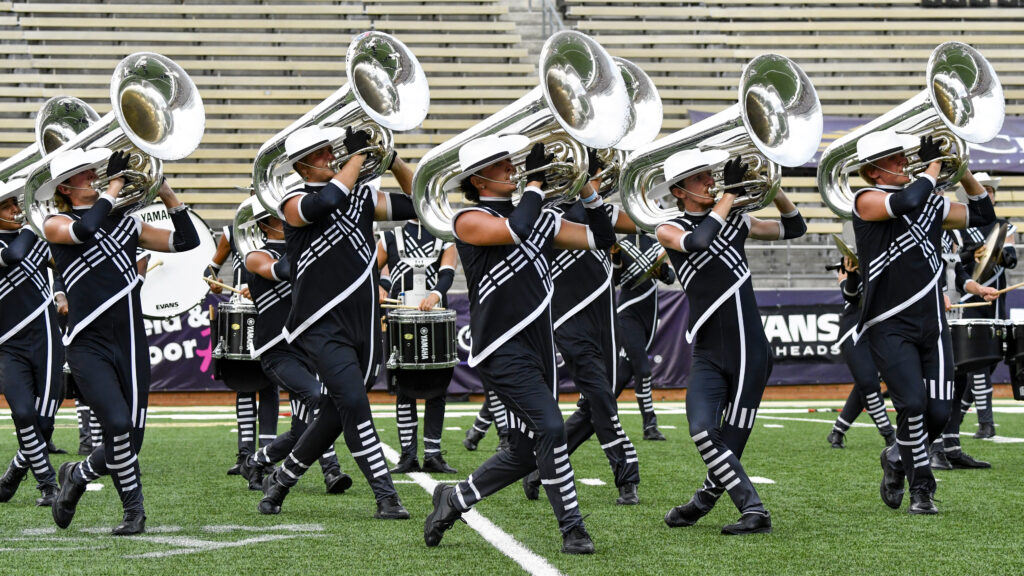Due to a construction delay in the completion of Lucas Oil Stadium in Indianapolis, the 2008 DCI World Championship was sent an hour down the road to Memorial Stadium at Indiana University in Bloomington.
The Blue Devils were undefeated up until the DCI Eastern Classic one weekend prior to the end of the tour when edged by Cavaliers, a corps that had never placed lower than second all season. At the World Championship Prelims, Phantom Regiment finished third behind the two aforementioned corps, then moved up to second in the Semifinals, only 0.125 over Cavaliers and 0.375 under the Devils.
In one of the most exciting finales ever witnessed at the DCI Finals, Regiment topped Blue Devils by the smallest margin possible, 0.025 points, to take the title with a show that had the audience yelling, “I am Spartacus!” during the production’s final moments. Not bad for a corps that earlier in the season had lost to the eventual seventh-place finisher Santa Clara Vanguard.
For the corps’ 50th anniversary, the ninth-place Blue Knights performed a show titled, “Knight Reign.” It was the fourth of the corps’ productions since 2004 that included some form of the word “Knight” in the show’s title. “A Knight’s Tale,” “A Midsummer Knight’s Dream,” and “Dark Knights” were the themes from 2004 to 2006.
The corps promoted the show as looking back at the events that contributed to the corps’ evolution, remembering the joys and challenges of years gone by. In addition, the word “Reign” was a homophone for “rain,” which was reflected in the titles of most of the musical selections.
In the years preceding 2008, Blue Knights had long defined a certain style of intellectualism that became the corps’ calling card. Near the opening of the show, the tubas were featured playing a long and low gurgling sound unlike anything ever before heard on the football field. Fans in the stands couldn’t help but think, “What’s it all about?” Which was perhaps part of the purpose in getting people to pontificate upon the corps’ cerebral approach to drum corps.
Extensive choreography that featured performers either leaping in the air or writhing on the ground had the members contorting their bodies in a variety of ways. Providing a visual calm that in contrast complemented such movement were the color guard’s stunning multi-hued hand-painted flags, long utilized to differentiate the corps from other units.

“Knight Reign” commenced with all the corps members huddled together in a tight formation as one lone trumpeter played a few counts of a minor mode rendition of the folk song, “Amazing Grace.”
Members of the color guard rang hand chimes to contribute an eerie effect while the tubas played the low gurgling sound earlier mentioned, introducing Eric Whitacre’s “Cloudburst,” written for chorus in 1995 and later arranged for band. The title of this selection was poetically reflected in the representation of rain as heard in sounds in the front ensemble and the hand chimes played by the guard members.
Without a pause, the corps launched into John Mackey’s “Turbine,” written in 2005 for concert band as a way to help the composer deal with his fear of flying. The first part of the work, rather tumultuous in character, represents the sound of a jet plane building up speed for takeoff, followed by the wonder of the earth as seen from high above. The horn line flooded the field with a deluge of power, musically and visually as if caught up in a blustering vortex of a rainstorm.
Originally a work written for solo piano in 1901, Maurice Ravel’s “Jeux D’eau” (loosely translated as “Water Games”) came next. According to Ravel, the piece was inspired by the sound of water as heard in sprays, cascades, and brooks. Blue Knights mostly utilized the work as a percussion feature, with the mallet keyboards replicating the whimsical nature of Ravel’s piano part.
Following “Jeux D’eau,” a Latin percussion intro launched the corps into Ben Johnston’s “String Quartet No. 4,” written in 1973 and based on variations of “Amazing Grace.” Johnston’s rendition utilized microtonal tuning, which had the string instruments “playing in the cracks” of the notes typically found in a musical scale. The piece achieved a renewed success when members of the Kronos Quartet recorded it on their “White Man Sleeps” album of 1987, which is where the corps’ staff discovered it. While the microtonal tuning was not possible to pull off on the drum corps field, the spirit of the rendition came through, though most fans had no idea they were listening to a unique version of “Amazing Grace.”
After the Johnston rendition, the show brought back a more recognizable rendering of “Amazing Grace.” In heroic fashion, the color guard performers revealed an assortment of pastel hand-painted flags that lit up the field, and in a sense, lit the way to the corps’ next 50 years.

Michael Boo was a member of the Cavaliers from 1975-1977. He has written about the drum corps activity for more than 35 years and serves as a staff writer for various Drum Corps International projects. Boo has written for numerous other publications and has published an honors-winning book on the history of figure skating.





